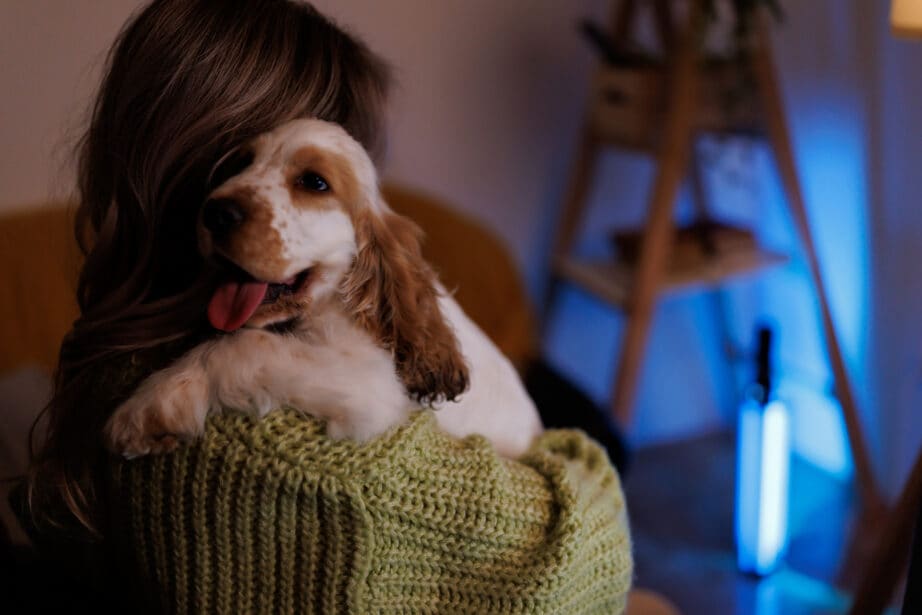Bringing home a cute little pup is one of the most exciting experiences in the world—but settling into your first night with your puppy can also be a little nerve-racking. To set everyone up for success, it’s important to plan ahead.
With veterinarian and dog trainer insights, we’re covering everything you need to know to help your puppy’s first night home go smoothly.
In This Guide:
1. Prepare To Give Your Pup Lots of Attention
This one seems easy enough—those tail wriggles and that pudgy belly are irresistible!—but you may find yourself putting in more effort than you imagined. We’re talking a little less sleep than usual and consistently being at the ready.
“Your puppy will need a lot of your time and attention the first night and for many nights after that, especially if this is their first night away from mom or siblings,” says Amanda Farah, CPDT-KA, a certified dog trainer and the coordinator of national training and behavior for Best Friends Animal Society. “Mom and their siblings used to provide safety and comfort, and now that’s your job.”
This is a big, important job too. If you can’t make-do with less sleep for a few weeks, adopting an older dog is a better idea, Farah notes.
2. Set Up a Safe Place To Sleep
You’ll need to provide your new puppy with a cozy and safe place to sleep. This includes finding a good location and outfitting it with new dog essentials: a crate, bedding, and water. If there’s room, you can also add a dog pee pad.
Andrea Y. Tu, DVM, a general practice veterinarian and chief of veterinary behavior medicine at Heart of Chelsea Veterinary Group in New York City, suggests a large penned-in area or a puppy-proofed bathroom.
Because puppies need frequent comfort and sometimes potty breaks throughout the night, keeping the safe space within earshot is a good idea, Farah adds. You can gradually move the pen or crate farther away as the puppy feels more secure and requires fewer nighttime visits.
“Even if you don’t intend to use a crate as your puppy grows up, it’s a good idea to get them accustomed to the feeling of confinement in case of travel, grooming, or vet visits that require crating,” Farah says.
3. Provide Them With Some Entertainment
Your pup may sleep through the first night, or they may end up getting bored. Whatever the case, come prepared with fun, puppy-safe toys—but nothing with loose pieces of string or pieces that the puppy can chew off and swallow accidentally.
“Puppy-safe chew toys, such as puppy Kongs, are a good option,” Dr. Tu says. “You can fill the center with canned puppy food and freeze it to create a long-lasting food-dispensing toy that will also soothe any gum soreness that results from teething.”
There’s a solid chance your puppy will cry, whimper, or bark in those early days together. This is especially true come nighttime when the house goes dark and everyone’s asleep.
If your puppy’s first night in the crate results in crying, don’t let them “cry it out.” Instead, go check on them to make sure they don’t need to pee or poop, and to show them you’re here to provide comfort.
“Puppies cry for a reason, and it’s likely because they are either hungry, need to eliminate, or are having a hard time adjusting to being away from their mom and littermates for the first time,” Dr. Tu says. “Letting them cry it out can be physically and emotionally traumatizing. You should check on the puppy regularly and ensure their needs are met.”
5. Take Them Out To Pee/Poop Frequently
Your teeny puppy has a teeny bladder, which means they need to go potty more often.
Take your puppy out to pee and poop right before bed and every time they wake up. Farah says you may also need to take them out several times in the night. Note that puppies thrive on routine, so try to take them out at the same times each day to establish good habits.
How long can puppies hold their bladder? It depends on the puppy. To start, take your dog out every hour, and gradually increase time between potty breaks to figure out how long your pup can hold it.
“A general rule for how often to take a puppy out is: Their age in months plus one equals the maximum number of hours they can hold their urine/bowel movements,” Dr. Tu says. For example, if you have a 2-month-old puppy, it’s likely they’ll need a potty break every three hours.
Pro Tip: If your puppy does have an accident, do not punish them. Instead, reinforce positive behavior by rewarding successful potty trips with praise or a small treat.
6. Stick to a Consistent Feeding Schedule
Similarly, set your puppy up for success by sticking to a consistent feeding schedule. To help minimize nighttime bathroom trips, plan their last meal at least a couple of hours before bedtime.
“Puppies need specific foods that help encourage and support rapid growth,” Dr. Tu says. Most puppies should be fed food that’s labeled for puppies or for all life stages.
Large breed puppies have different growth and development needs, so they typically need a diet that’s formulated specifically for them. Talk to your veterinarian about the best diet for your dog.
“Puppies also have small stomachs,” Dr. Tu continues, “which means they are unable to eat enough food in a single meal to last them for long periods. They should be fed at least three to four times a day, spaced out equally during the day.”
Frequently Asked Questions on the First Night With a Puppy
Q:Do I let my puppy cry it out the first night?
A:
No, puppies should never “cry it out.” The goal is to raise a secure, confident dog who knows they can look to you for safety and comfort, and that means your puppy must know you’ll be there to meet their needs.
These early days are not the time to worry that you may be encouraging crying or barking. Once your puppy feels secure at home and has settled in, you can begin helping them feel more comfortable while alone.
Q:Can my puppy sleep in my bed on the first night?
A:
Co-sleeping with dogs is a personal preference, but wait to do this until they’re at least a year old. Puppies should be set up with their sleep area until they can hold their tiny bladders a bit longer. It wouldn’t be very fun to wake up and realize your cute, fluffy friend has peed the bed!
Once they’ve grown older, you can co-sleep with your dog—so long as you don’t mind extra fur or dirty paws in bed!
This content was medically reviewed by Jo Cornett, DVM, Chewy veterinarian.
Share:














